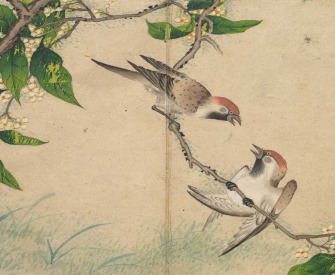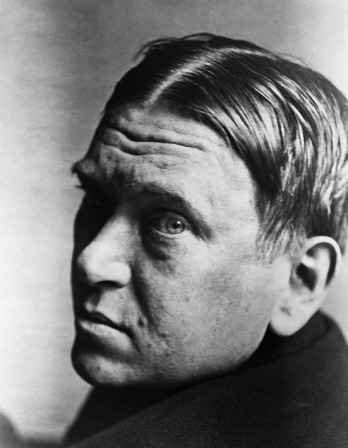Hermes took the lyre upon his left arm and tried each string in turn with the key, so that it sounded awesomely at his touch. And Phoebus Apollo laughed for joy; for the sweet throb of the marvelous music went to his heart, and a soft longing took hold of his soul as he listened.
Apollo opened his mouth and spoke winged words to Hermes: “Come now, tell me this, resourceful son of Maia: Has this marvelous thing been with you from your birth, or did some god or mortal man give it to you—a noble gift—and teach you heavenly song? For wonderful is this new-uttered sound I hear, the like of which I vow that no man nor god dwelling on Olympus ever yet has known but you, O thievish son of Maia. What skill is this? What song for desperate cares? What way of song? For verily here are three things to hand all at once from which to choose—mirth and love and sweet sleep. And though I am a follower of the Olympian Muses, who love dances and the bright path of song—the full-toned chant and ravishing thrill of flutes—yet I never cared for any of those feats of skill at young men’s revels as I do now for this. I am filled with wonder, O son of Zeus, at your sweet playing. But now since you, though little, have such glorious skill, sit down, dear boy, and respect the words of your elders. For now you shall have renown among the deathless gods, you and your mother also. This I will declare to you exactly: by this shaft of cornel wood, I will surely make you a leader renowned among the deathless gods, and fortunate, and will give you glorious gifts and will not deceive you from first to last.”
Then Hermes answered him with artful words: “You question me carefully, O Far-Worker; yet I am not jealous that you should enter upon my art; this day you shall know it. For I seek to be friendly with you both in thought and word. Now, you well know all things in your heart, since you sit foremost among the deathless gods, O son of Zeus, and are goodly and strong. And wise Zeus loves you and has given you splendid gifts. And they say that from the utterance of Zeus, you have learned both the honors due to the gods, O Far-Worker, and oracles from Zeus, even all his ordinances. Of all these I myself have already learned that you have great wealth. Now, you are free to learn whatever you please; but since, as it seems, your heart is so strongly set on playing the lyre, chant, and play upon it, and give yourself to merriment, taking this as a gift from me, and do you, my friend, bestow glory on me. Sing well with this clear-voiced companion in your hands; for you are skilled in good, well-ordered utterance. From now on bring it confidently to the rich feast and lovely dance and glorious revel, a joy by night and by day. Whoso with wit and wisdom inquires of it cunningly, him it teaches through its sound all manner of things that delight the mind, being easily played with gentle familiarities, for it abhors toilsome drudgery; but whoso in ignorance inquires of it violently, to him it chatters mere vanity and foolishness. But you are able to learn whatever you please. So then, I will give you this lyre, glorious son of Zeus.”
When Hermes had said this, he held out the lyre, and Phoebus Apollo took it and readily put his shining whip in Hermes’ hand and ordained him keeper of herds.
From the Homeric Hymns. Composed in hexameter, the same meter as the Homeric epics, these thirty-three songs honoring the Greek pantheon were declared by Thucydides to be the work of Homer, although modern scholars argue that they were more likely composed by several different poets between 700 and 500 bc and were originally intended for performance at festivals, many of which included singing competitions. This hymn, the fourth, is the longest. In it, the infant god Hermes steals Apollo’s cattle, vowing to become “a prince of robbers.”
Back to Issue




